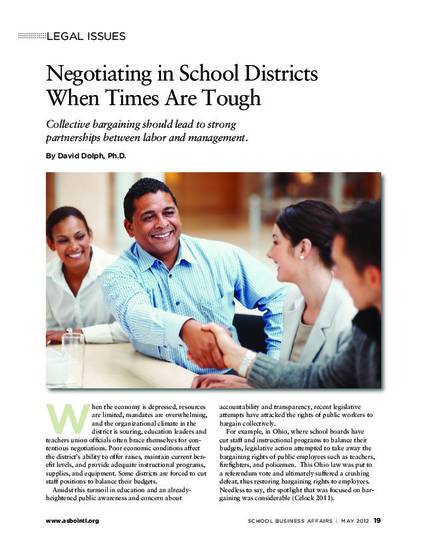
Article
Negotiating in School Districts When Times Are Tough
School Business Affairs
Document Type
Article
Publication Date
5-1-2012
Abstract
When the economy is depressed, resources are limited, mandates are overwhelming, and the organizational climate in the district is souring, education leaders and teachers union officials often brace themselves for contentious negotiations. Poor economic conditions affect the district’s ability to offer raises, maintain current benefit levels, and provide adequate instructional programs, supplies, and equipment. Some districts are forced to cut staff positions to balance their budgets.
Amidst this turmoil in education and an already- heightened public awareness and concern about accountability and transparency, recent legislative attempts have attacked the rights of public workers to bargain collectively.
Inclusive pages
19-21
ISBN/ISSN
0036-651X
Document Version
Published Version
Copyright
Copyright © 2012, Association of School Business Officials International
Publisher
Association of School Business Officials International
Place of Publication
Reston, VA
Disciplines
- Educational Administration and Supervision,
- Educational Assessment, Evaluation, and Research,
- Educational Leadership,
- Education Economics,
- Elementary and Middle and Secondary Education Administration,
- Higher Education Administration,
- Other Educational Administration and Supervision,
- Special Education Administration and
- Urban Education
Citation Information
David Alan Dolph. "Negotiating in School Districts When Times Are Tough" School Business Affairs Vol. 78 Iss. 5 (2012) Available at: http://works.bepress.com/david_dolph/13/

This article originally appeared in the May 2012 School Business Affairs magazine and is reprinted with permission of the Association of School Business Officials International (ASBO). The text herein does not necessarily represent the views or policies of ASBO International, and use of this imprint does not imply any endorsement or recognition by ASBO International and its officers or affiliates.
Permission documentation on file.